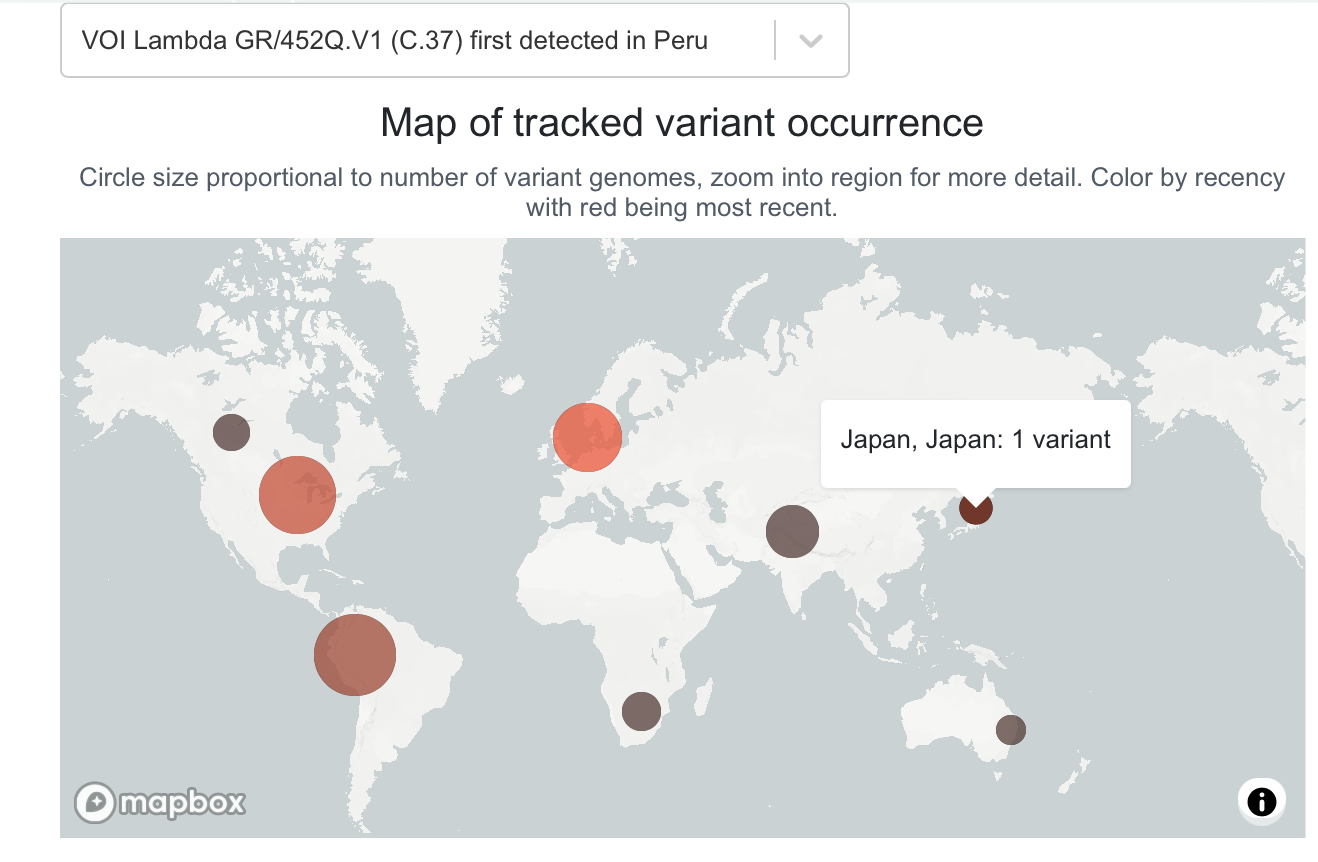(First posted 23:59 August 18th, revised and updated 00:40 am August 19)
The Tokyo 2020 Olympics are over but they may leave a lasting legacy in Japan: the deadly COVID19 Lambda variant; it first arrived on July 20th, when a woman in her thirties from Peru, accredited with the Tokyo 2020 games arrived at Haneda Airport. The government only admitted to the arrival of the variant after our reports on August 6. Tonight at 10:39 pm NHK reported that the Ministry of Health failed to conduct an investigation into those in close contact with her, or notify the Tokyo Olympic Organizing Committee. The Lambda variant, originally found in Peru, has killed thousands there and in July of this year accounted for 90% of new COVID19 cases. It has been associated with a high-mortality rate, around 9%, and a recent study suggested, “it could pose a threat to the human race.”
Whether the Lambda variant is as deadly as the Delta variant remains to be seen, but it’s definitely not a variant you want to welcome into your home.
The Story So Far
The lambda variant travelled to Japan with a woman who had resided in Peru. She tested positive for COVID19 upon arriving at Haneda Airport, on April 20, and was quarantined. On July 23, the National Institute of Infectious Diseases (NIID) determined that she was infected with the Lambda variant and reported this to the Ministry of Health. On July 26, the Ministry reported their findings to an international infectious diseases database, GISAID. Despite, concerns at the NIID, the government decided to postpone an announcement of the findings until after the Olympics had concluded.
On August 6, after our first report, the Ministry released details to the Japanese press and gave comments to The Daily Beast. The Ministry has denied that they were covering up the entry of the variant, due to the Olympics, saying that it did not meet their criteria for public disclosure. However, today on August 19, the cabinet spokesman, at a press conference announced that the Ministry was rethinking it’s policy on handling of variants and would be more forthcoming with information in the future.
Lambda On The Loose?
Then at 10:39 pm, NHK News, reported the following. The Ministry of Health had failed to send critical information to the local government where the Lambda carrier was being quarantined. The Ministry of Health normally sends a list of people who may have been in close contact with a carrier to the local government responsible for carrying out an investigation into the source of the virus, and preventing the spread of it into the public. This list usually includes the seating chart of the aircraft, when the infection is confirmed by a quarantine station at the airport.
NHK reported that after the woman was confirmed to be infected with the Lambda virus, the Ministry failed to notify the local government where she was staying and neither her name nor the list was not sent to the Tokyo Olympic Organizing Committee. This raises the possibility that Lambda variant is already on the lam in Japan, spreading into the local population.
The World Health Organization considers Lambda a “variant of interest” (VOI) but has not yet labeled it a variant of concern (VOC), a term reserved for variant that are either highly infectious, resistant to vaccines, and/or result in higher mortality. Japan has not classified the variant yet and is only testing for it at airports. This means that if the virus has made it into the general population, it’s unlikely to be found until it has taken root—because there is no screening or sampling for the virus being conducted. Japan has consistently failed to conduct the basis of COVID19 prevention and containment: widely test, trace, isolate, medicate and vaccinate.
The Ministry of Health, Labor and Welfare (MHLW) told NHK that “the person in charge was so busy with work that he forgot to send the list,” and that they will set up a system to double-check that the list was sent. They have also downplayed the risk of Lambda, saying that it is on the wane in many countries and less virulent than the Delta variant. However…..
Know Your Lambda
On July 28, Japanese scientists posted a report on the Lambda variant eight days after its domestic detection. The document is yet to be peer-reviewed.
In the document, the authors state that the Lambda variant is highly infectious, less susceptible to current vaccinations, and shows resistance to antiviral immunity elicited by vaccination. The report continues that because the “Lambda variant is relatively resistant to the vaccine-induced antisera” (blood serum containing antibodies produced in response to vaccination), “it might be possible that this variant is feasible to cause breakthrough infection” in already vaccinated populations. The scientists worry the variant’s categorization as a VOI instead of a VOC downplay the virus’s potential threat to public health.
